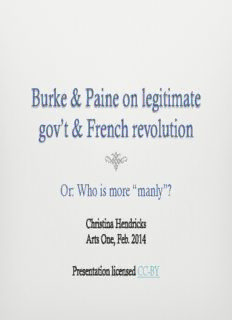
Burke & Paine on legitimate gov't & French revolution PDF
Preview Burke & Paine on legitimate gov't & French revolution
Burke & Paine on legitimate gov’t & French revolution Or: Who is more “manly”? CC-BY Edmund Burke and Thomas Paine Burke, 1729-1797 Paine, 1737-1809 Wikimedia Commons, public domain Wikimedia Commons, public domain What can make governmental authority legitimate? Why should we obey political authorities such as those who make and enforce the laws? A common answer over the last few centuries: -- what legitimizes governmental authority is the consent of the people -- and that the government upholds the natural rights of humans Hobbes and Locke: start with state of nature w/natural rights, then consent to set up commonwealth Hobbes, Leviathan (1651) State of nature consent commonwealth • Natural equality among humans (at least in terms of vulnerability to attack (Chpt. XIII.1-2) • Right of nature: “the liberty each man hath to use his own power, as he will himself, for the preservation of his own nature, that is to say, of his own life, and consequently of doing anything which, in his own judgment and reason, he shall conceive to be the aptest means thereunto” (Chpt. XIV.1) Hobbes, Leviathan (1651) State of nature consent commonwealth Commonwealth created by “a covenant of every man with every man, in such manner, as if every man should say to every man, I authorize and give up my right of governing myself, to this man, or to this assembly of men, on this condition, that thou give up thy right to him, and authorize all his actions in like manner” (XVII.13) People obliged to obey the sovereign b/c voluntarily transferred some of their rights to it: “there [is] no obligation on any man which ariseth not from some act of his own; for all men equally are by nature free” (XXI.10). Hobbes, Leviathan (1651) State of nature consent commonwealth • Sovereign authority can be in one person, a small group, or the people (monarchy, aristocracy, democracy) (XIX) • Once established, can’t overthrow or change it -- unless it fails to protect the people (XXI.21) • So though a people’s consent is the ground of authority, can’t (usually) change rule by popular choice once chosen The Glorious Revolution, England 1688 An example of Hobbesian process of establishing sovereign? King James II: pro-Catholic policies, dispensing with laws passed by parliament, dismissing parliament entirely…led to anger Then birth of Catholic son and heir led to fear James II of England, Wikimedia commons, public domain The Glorious Revolution, England, 1688 Daughter of James II, Mary married to William of Orange; William invited to invade England by aristocrats; James does not fight back & tries to flee for France Interim parliament declares William & Mary monarchs; Bill of Rights (1689) submits the people to their rule & that of their heirs “forever” King William, Wikimedia, public domain Queen Mary, Wikimedia, public domain Dr. Richard Price, Glorious Revolution rested on Sermon on Glorious several principles & rights, Revolution (1789) including: • Right to resist power when abused • Right to choose own governors • Right to frame a gov’t for ourselves (see Paine p. 8) Monarch was chosen by the people, so is a servant of the people more than a sovereign Richard Price, by Benjamin West, Wikimedia Commons, public domain Burke on Glorious Revolution From Reflections on the Revolution in France, 1790 Glorious Revolution provided for a hereditary monarchy, “forever” (Paine p. 8) The people thereby rejected the idea of choosing their own governors The people chose the gov’t, but after that are Burke looking over the shoulder of Price (1790), not the seat of authority Wikimedia Commons, public domain
Description: